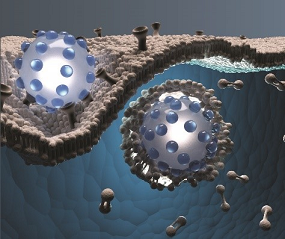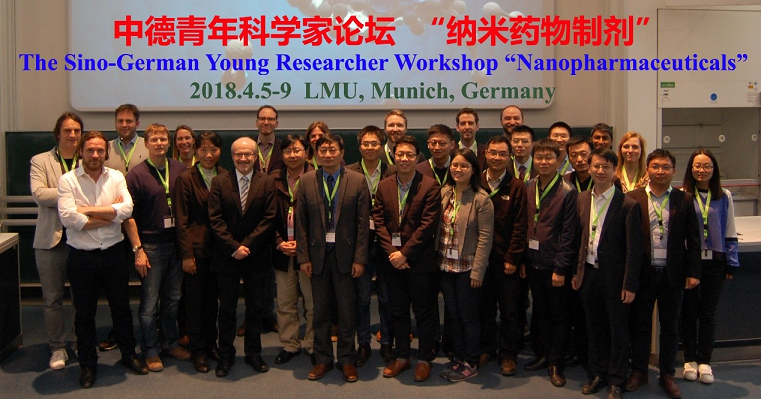|
The Sino-German Young Researcher Symposium on “Nanopharmaceuticals: Drug Delivery in the Nanoscale” was held at the LMU Munich in Germany. - 2018.4.9

Receptor-mediated endocytosis of a nanoparticle. Image by Christoph Hohmann, Nanosystems Initiative Munich (NIM).
The Sino-German Young Researcher Symposium on “Nanopharmaceuticals: Drug Delivery in the Nanoscale” was held at the LMU Munich to promote the scientific exchange between young scientists from China and Germany, working on new nanocarrier formulations and drug delivery.
Nanopharmaceuticals represent an innovative class of chemically engineered pharmaceutical products making use of the technological progress in materials science, nanotechnology and drug formulations. Utilizing nanotechnology for drug delivery enables researchers to control physico-chemical and pharmacokinetic properties such as solubility, absorption, release and biodistribution of the bioactive agents, as well as their guidance through biological barriers and accumulation in specific target tissues. The Sino-German Young Researcher Symposium in Munich on “Nanopharmaceuticals: Drug Delivery in the Nanoscale” was organized by Dr. Ulrich Lächelt (Department of Pharmacy, LMU Munich, Germany) and Prof. Rongqin Huang (School of Pharmacy, Fudan University, Shanghai, China). Aim was to bring young scientists from both countries together, to discuss on their researches and innovative new ideas, and also to provide a platform for the initiation of future Sino-German collaborations. 30 speakers from China (13), Germany (15), UK (1) and Austria (1) met at the LMU between April 5th and 9th 2018 for a vivid exchange of new developments, recent results and ideas in the field of nanopharmaceuticals. The distinguished scientists, Prof. Weiyue Lu (Fudan University, Shanghai, China) and Prof. Wolfgang Parak (University of Hamburg, Germany), acted as Chinese and German senior experts in the field.

Around 150 interested guests joined the scientific talks and discussions in the audience. The talks provided exciting insights into recent researches on a broad spectrum of nanomaterials and formulations as well as new therapeutic approaches based on nanopharmaceuticals for the treatment of cancer and other diseases. Several speakers also encouraged critical assessment of nanopharmaceuticals regarding feasibility of industrial large-scale production and potential for clinical translation. The symposium ended with great success and a continuation of this scientific forum in the future is planned.
The organizers highly appreciate funding by the Sino-German Center for Research Promotion (GZ 1454) which was crucial for the realization.
|